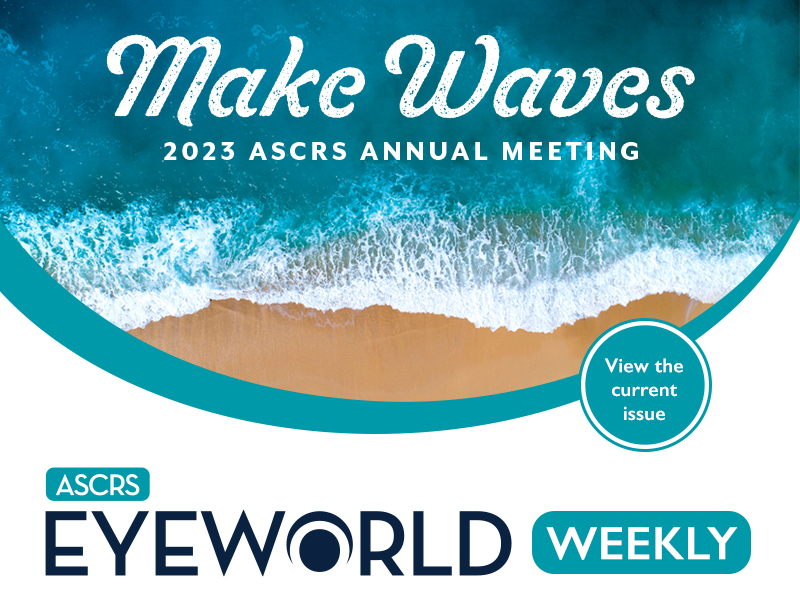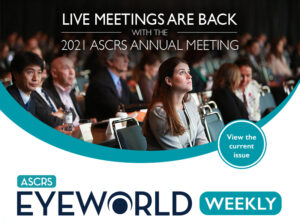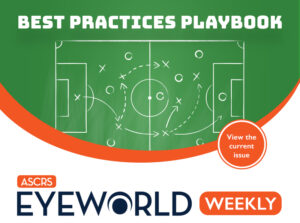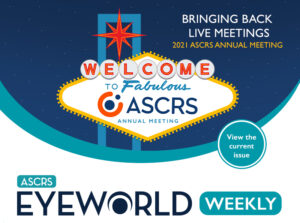
- FDA approves twice-daily use of presbyopia drop
- Study: drug approved for high blood pressure shows promise for blinding childhood disease
- Breakthrough device designation granted to investigational dry AMD therapy
- Positive topline results for Phase 2 study of retinitis pigmentosa treatment
- FDA approves pediatric enrollment in trial for retinitis pigmentosa and Leber congenital amaurosis
- ASCRS news and events
April 7, 2023 • Volume 29, Number 14
FDA approves twice-daily use of presbyopia drop
The FDA approved twice-daily dosing/use of VUITY (pilocarpine HCI ophthalmic solution) 1.25% for adult patients with presbyopia. The second dose is comprised of one additional drop in each eye 3–6 hours after the initial dose/drop, according to the company’s press release. The company reported that this additional approval for the drug, which was approved as the first drop indicated for presbyopia in October 2021, was based on a Phase 3 trial that included 230 patients randomized to receive either VUITY or placebo twice daily, 6 hours apart for 14 days. The company reported that the primary endpoint (a 3 or more letter gain on a near vision chart in low light, high contrast, binocular DCNVA with no more than a 5 letter loss in low-light CDVA) at day 14, hour 9 (3 hours after the second drop) was achieved 35.1% of the time with VUITY and 7.8% with placebo.
Study: drug approved for high blood pressure shows promise for blinding childhood disease
The NEI reported on a study that showed an already FDA-approved drug for another indication could have application for treatment of Leber congenital amaurosis type 10 (LCA 10). According to the article, in three models of LCA 10, Reserpine, which was approved in 1955 for high blood pressure, kept photoreceptors alive. The study was published in the journal eLife. The authors wrote that the research helped identify drug candidates for retinal ciliopathies and provided new insights on the pathogenesis and potential treatments for these diseases.
Breakthrough device designation granted to investigational dry AMD therapy
Pixium Vision was granted FDA Breakthrough Device Designation for its Prima System for treatment of dry AMD. According to the company’s press release, this will streamline the regulatory review process of the device, which is comprised of a subretinal photovoltaic wireless implant intended for patients who have outer retinal degeneration. The device is intended to substitute the photoreceptors, providing simultaneous use of the prosthetic and natural peripheral vision, according to the press release.
Positive topline results for Phase 2 study of retinitis pigmentosa treatment
Nanoscope Therapeutics announced positive topline results from its Phase 2 study of MCO-010 for treatment of retinitis pigmentosa. According to the company, 88.9% of patients treated with MCO-010 had a clinically meaningful two or more luminance level improvement in vision-guided mobility or object recognition, and clinically meaningful visual acuity gains were also observed in some patients. There were no serious treatment-related adverse effects. The company described MCO-101 as an ambient light activatable multi-characteristic opsin optogenetic therapy. The therapy is intended for advanced retinitis pigmentosa irrespective of the genetic mutation that caused it. The FDA has approved this investigational drug for both an orphan drug designation and a fast-track designation.
FDA approves pediatric enrollment in trial for retinitis pigmentosa and Leber congenital amaurosis
Ocugen announced that the FDA approved enrollment of pediatric patients into its ongoing Phase 1/2 trial of OCU400 for treatment of retinitis pigmentosa and Leber congenital amaurosis. According to the company’s press release, OCU400 is a gene-agnostic modifier gene therapy product based on the gene NR2E3. A Phase 3 trial is expected to begin at the end of this year.
ASCRS news and events
- ASCRS Annual Meeting: Register for the ASCRS Annual Meeting, May 5–8, in San Diego, California. Check theASCRS ASOA Real-Time Program for the latest program details.
- Eyecelerator: Registration is open for Eyecelerator @ ASCRS 2023. The innovation conference from ASCRS and the American Academy of Ophthalmology will be held on May 4 in San Diego, California. Join investors, industry leaders, and ophthalmologists at this showcase of companies, technology, and other exciting innovation topics in ophthalmology.
Research highlights
- A double-blind, prospective, randomized study compared the efficacy and visual disturbance profile disturbance profiles of two EDOF IOLs. The study, performed by a single surgeon, included 138 eyes of 69 patients who had bilateral implantation of 1 or 2 EDOF IOLs. Patients were randomized to receive either the Symfony IOL (Johnson & Johnson Vision) or Vivity IOL (Alcon). According to the study, at 3 months postop, 21 patients (60%) in the Symfony group did not have glare compared to 30 (88%) in the Vivity group. Starburst prevalence and severity were lower in the Vivity group compared to Symfony. The authors reported that visual acuity and refractive outcomes were similar between the two groups. The study is published in the Journal of Cataract & Refractive Surgery.
- The long-term outcomes of immediate primary phacoemulsification for eyes with acute primary angle closure and in fellow eyes with shallow anterior chambers to prevent angle closure were evaluated in a study published in Clinical Ophthalmology. The retrospective study found that BCVA significantly improved at 1 month, 3 years, and the last visit compared to preoperative status. IOP also significantly decreased at these timepoints. IOP-lowering medication use decreased by 1 month postop compared to preop use. The number of corneal endothelial cells was not significantly different when comparing preoperative numbers to the numbers more than 2 weeks after phaco. The authors concluded that primary phaco improved visual acuity for eyes with acute primary angle closure and maintained good IOP control without needing reoperation.
Product news
- WaveFront Dynamics launched the WaveDȳn Vision Analyzer.
This issue of EyeWorld Weekly was edited by Stacy Jablonski, Liz Hillman, and Ellen Stodola.
EyeWorld Weekly (ISSN 1089-0319), a digital publication of the American Society of Cataract and Refractive Surgery (ASCRS), is published every Friday, distributed by email, and posted live on Friday.
Medical Editors: Sumit “Sam” Garg, MD, Chief Medical Editor, Mitchell Weikert, MD, Cataract Editor, Karolinne Rocha, MD, PhD, Refractive Editor, Julie Schallhorn, MD, Cornea Editor, Manjool Shah, MD, Glaucoma Editor
For sponsorship opportunities or membership information, contact: ASCRS • 12587 Fair Lakes Circle • Suite 348 • Fairfax, VA 22033 • Phone: 703-591-2220 • Fax: 703-591-0614 • Email: ascrs@ascrs.org
Mention of products or services in EyeWorld Weekly does not constitute an endorsement by ASCRS.
Click here to view our Legal Notice.
Copyright 2023, EyeWorld News Service. All rights reserved.



